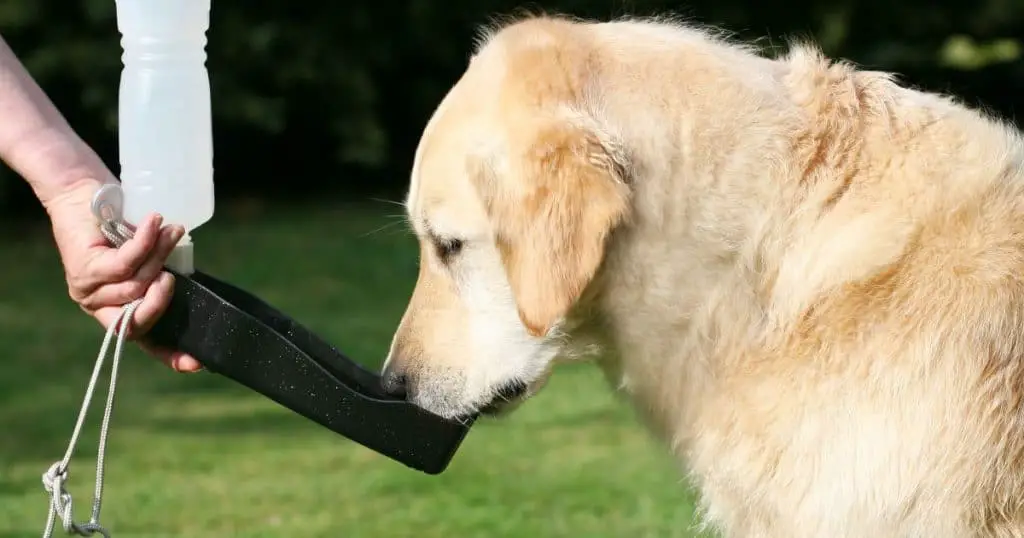What to Know
If you’re a dog owner, you may have heard of apple cider vinegar as a natural remedy for various health issues. But can dogs consume apple cider vinegar? The answer is yes, but there are some important things to consider before adding it to your dog’s diet.
Apple cider vinegar is a fermented liquid made from crushed apples. It’s known for its antibacterial and antifungal properties and has been used for centuries to treat a variety of ailments in humans. Some of these benefits may also apply to dogs, but it’s important to use apple cider vinegar in moderation and under the guidance of a veterinarian.
Can Dogs Consume Apple Cider Vinegar?

In this article, we’ll explore the potential benefits and risks of giving apple cider vinegar to dogs, as well as how to safely incorporate it into their diet. We’ll also discuss some common misconceptions about apple cider vinegar and provide tips for choosing the right type of vinegar for your furry friend.
What is Apple Cider Vinegar?

Apple cider vinegar (ACV) is a type of vinegar made from fermented apple juice. It is a pale to medium amber color and has a distinctive sour taste. ACV is commonly used in cooking, but it also has a range of health benefits for both humans and animals.
ACV is made by crushing apples and extracting the juice. Bacteria and yeast are then added to the juice, which ferments the natural sugars in the apples and turns them into alcohol. The alcohol is then converted into acetic acid by a second fermentation process, which gives the vinegar its characteristic sour taste.
ACV is a natural and safe product that has been used for centuries for a variety of purposes. It is rich in vitamins, minerals, and antioxidants, and has been shown to have many health benefits for both humans and animals. However, it is important to use ACV in moderation and to dilute it properly before giving it to your dog.
Is Apple Cider Vinegar Safe for Dogs?

Apple cider vinegar is a natural remedy that has been used for centuries to treat various ailments in humans. But what about dogs? Is it safe for them to consume or use topically? Here, we will explore the benefits and risks of using apple cider vinegar for dogs.
Benefits of Apple Cider Vinegar for Dogs
Apple cider vinegar has several potential benefits for dogs, including:
- Improving digestion: Apple cider vinegar can help regulate the pH levels in a dog’s stomach, which can improve digestion and alleviate symptoms of digestive issues such as bloating, gas, and constipation.
- Boosting immunity: The acetic acid in apple cider vinegar has antibacterial and antifungal properties that can help boost a dog’s immune system and fight off infections.
- Relieving itching and skin irritation: When used topically, apple cider vinegar can help soothe itchy skin and relieve skin irritation caused by allergies, flea bites, or other skin conditions.
Risks of Apple Cider Vinegar for Dogs
While apple cider vinegar can offer several benefits to dogs, it’s important to use it with caution and under the guidance of a veterinarian. Some potential risks of using apple cider vinegar for dogs include:
- Acidic nature: Apple cider vinegar is acidic, and consuming too much of it can lead to stomach irritation, vomiting, and diarrhea in dogs.
- Damage to tooth enamel: The acidity of apple cider vinegar can also damage a dog’s tooth enamel if used too frequently or in high concentrations.
- Interference with medication: Apple cider vinegar can interfere with certain medications, such as diuretics and insulin, so it’s important to consult with a veterinarian before using it if your dog is taking any medications.
In conclusion, apple cider vinegar can offer several benefits to dogs when used in moderation and under the guidance of a veterinarian. However, it’s important to be aware of the potential risks and use it with caution to avoid any adverse effects.
How to Give Apple Cider Vinegar to Dogs?

Dosage of Apple Cider Vinegar for Dogs
Dosage is important when it comes to giving apple cider vinegar to your dog. It is always recommended to consult with your veterinarian before starting any new supplement or treatment for your dog. The amount of apple cider vinegar you give to your dog will depend on their weight and overall health. A general rule of thumb is to give 1 teaspoon of apple cider vinegar per 50 pounds of body weight, up to a maximum of 1 tablespoon per day.
Ways to Give Apple Cider Vinegar to Dogs
There are several ways to give apple cider vinegar to your dog. Here are some of the most common:
- Adding it to food: You can add a small amount of apple cider vinegar to your dog’s food. Start with a small amount and gradually increase the dosage over time.
- Mixing it with water: Mix 1 teaspoon of apple cider vinegar with 1 cup of water and give it to your dog in a bowl. You can also use this mixture as a rinse for your dog’s coat and skin.
- Using it as a spray: Mix 1 part apple cider vinegar with 3 parts water in a spray bottle. You can use this mixture as a natural flea and tick repellent or as a general cleaning spray for your dog’s bedding and toys.
- Applying it topically: You can apply apple cider vinegar directly to your dog’s skin to help soothe hot spots or other skin irritations. Dilute the apple cider vinegar with water before applying it to your dog’s skin.
It is important to monitor your dog’s reaction to apple cider vinegar and adjust the dosage as needed. If your dog experiences any adverse reactions, stop giving them apple cider vinegar and consult with your veterinarian.
Before You Go
After researching the topic of whether dogs can eat apple cider vinegar, it is clear that there are mixed opinions on the matter. Some sources suggest that apple cider vinegar can have health benefits for dogs, such as boosting their immune system and preventing harmful bacteria from entering their bodies.
However, it is important to note that there is no conclusive evidence to support these claims. While apple cider vinegar may be safe for dogs to consume in small quantities, it is always best to consult with a veterinarian before introducing any new food or supplement into your dog’s diet.
Additionally, it is important to remember that every dog is unique and may react differently to certain foods and supplements. Some dogs may experience negative side effects from consuming apple cider vinegar, such as upset stomach or diarrhea.
In conclusion, while apple cider vinegar may have potential health benefits for dogs, it is important to approach this supplement with caution and always consult with a veterinarian before incorporating it into your dog’s diet.

